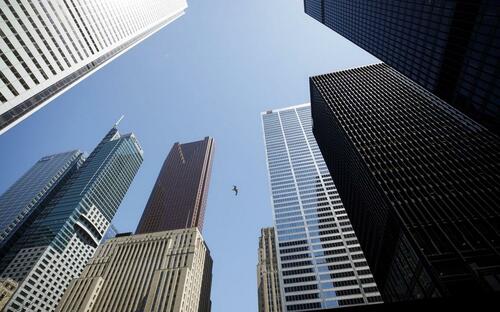Trudeau Sets “Dangerous Precedent” With Tax Hikes On Canadian Banks And Insurers
Canada’s banks and financial institutions were eager to do PM Justin Trudeau’s bidding when he called on them to financially excommunicate anybody caught supporting the “Freedom Convoy” of Canadian truckers.
Now they’re being rewarded with some of the biggest tax hikes in recent memory.
To wit, Bloomberg reports that Canadian Finance Minister Chrystia Freeland has imposed a “one-time windfall levy” on Canada’s biggest banks and insurance companies, while also permanently hiking their income-tax rate, in keeping with the Liberals’ campaign promises. The new taxes are expected to result in C$6.1 billion ($4.8 billion) in tax revenue over the past five years.
The measures will force banks and insurance companies to pay an additional C$6.1 billion ($4.8 billion) in tax over five years, according to Freeland’s budget plan released Thursday. The new taxes are virtually certain to be implemented because Prime Minister Justin Trudeau has already secured the support of a left-leaning opposition party to pass the budget law.
The government’s logic for justifying the tax hikes (much to the chagrin of the C-suite at these institutions) is that the banks benefited from the taxpayer-backed COVID bailout programs. Now, it’s time for them to pay it forward. The government said that massive, government-funded COVID support programs have helped the financial sector recover faster than other parts of the economy, and now it’s time to pay some back.
Of course, Canada’s banks can at the very least look forward to some additional revenues as rising interest rates will help boost their net interest margin.
But ultimately, it’s the borrowers who will suffer, as higher taxes will force the banks to demand even more interest on their loans, effectively creating a double-whammy that will raise the cost of everything from starting a business to buying a home.
Investors who own shares of the big Canadian banks will likely also share some of the burden as their stocks are expected to take a hit, as RBC Capital Markets analyst Darko Mihelic.
The windfall tax may set a “dangerous precedent that long term investors will be hard-pressed not to notice”.
“Banks’ earnings move with the economic cycle. By ignoring the earnings downside during a recession and punishing banks when earnings recover, an expectation may build for future cycles, ultimately harming valuations over the longer term”.
If there’s a silver lining, it’s that the even higher tax hikes that Trudeau had once threatened didn’t pan out.
While the measures are in line with what Trudeau had signaled was coming, the tax may prompt a negative share reaction for the banks on Friday, as some investors may have either ignored the issue or hoped that a flurry of lobbying from the banks would work, said Barclays analyst John Aiken.
“There was some concern, as imaginations started spiraling, that this was going to be absolutely awful,” Aiken said in an interview. “But it was within what had broadly been put out in the campaign promises.”
The windfall tax will apply to all taxable income earned last year by the banks and insurers.
The windfall tax of 15% applies to taxable income earned last year by banks and insurers in Canada over C$1 billion. That will force them to pay about C$4.1 billion, sliced into payments from 2022 to 2027, according to budget documents.
But the government did not go quite as far in increasing the banks’ income tax rate as Trudeau had threatened to during last year’s campaign. The prime minister had pledged to increase the maximum federal income rate for financial institutions to 18% from 15%.
Instead, Freeland is lifting it to 16.5% but lowering the threshold at which the new rate will apply to C$100 million from an original target of C$1 billion. That measure will mean about C$2 billion in additional taxes over five years, government estimates show.
The big question now: how will these tax hikes affect foreign investment in Canada?
Tyler Durden
Fri, 04/08/2022 – 20:00

